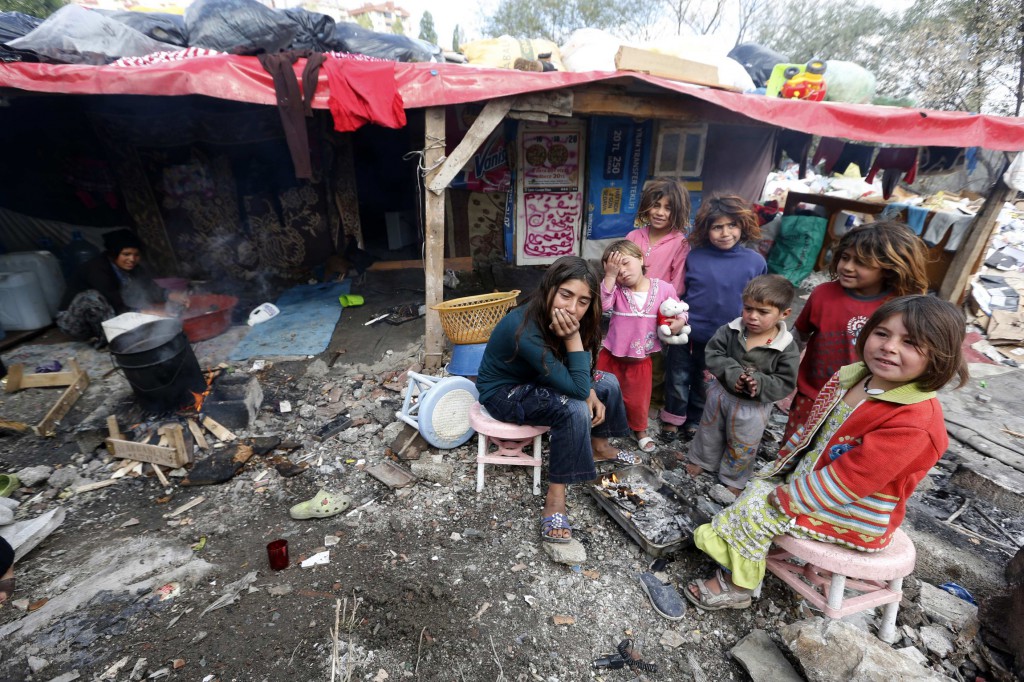
By Beth Griffin
Refugees and migrants pay the highest price in conflicts around the world and it is in the Catholic Church’s DNA to provide them humanitarian aid and prayerful support, according to speakers at a U.N. event Oct. 4.
The panel was held in conjunction with the U.N. High-level Dialogue on International Migration and Development.
“Both migrants and the populations that receive them belong to a single human family, and both enjoy the right to the goods of the earth, goods which are destined for universal enjoyment,” said Archbishop Francis A. Chullikatt, papal nuncio to the United Nations.
The sad situation of refugees and internally displaced people is not their fault and not of their choosing, he said.
Catholic institutions are actively engaged in helping refugees, “not because someone asked us. We’ve been doing it for centuries and will always do it, in spite of difficulties, dangers and hardships,” Archbishop Chullikatt said.
Speakers addressed the humanitarian response to the refugee crisis throughout the Middle East, while noting the Syrian situation is most prominent in the public eye.
In the past two years, violence in Syria forced at least 2 million people to flee the country and displaced another 4.5 million people internally, said Don Kerwin, executive director of the Center for Migrations Studies in New York.
“Meeting the basic needs of refugees demands the active commitment and engagement of the international community,” he said.
Vulnerable populations, including women, children, religious minorities and unaccompanied minors require special consideration, Kerwin said. The United States and other countries should consider resettlement for these groups and the U.S. government must re-examine terrorism-related laws that bar admission to many Syrian refugees, without regard to mitigating circumstances.
The long-term solution to the crisis in Syria “is a cease-fire and a negotiated peace that will end the conflict between government and rebel forces,” Kerwin said. “A negotiated peace will help stabilize the region and establish the preconditions necessary to provide durable solutions to the refugee and related humanitarian crises afflicting the region.”
Najla Chadla, director of Caritas Lebanon Migrant Center, said Lebanon is the smallest country in the Middle East but has the highest number of refugees and migrants. Foreigners comprise half the population, she said.
The Christian minority is among the most vulnerable of the refugees. Many Syrian Christians are afraid to register for aid because of pervasive religious persecution and long-standing interreligious tensions in their home country.
Refugees live in overcrowded, impoverished areas, beset by infrastructure and security problems. Shelter is limited, life is expensive, jobs, health care and education are scarce, and stress is high, Chadla said. There is competition between refugees and established migrant workers. Lack of coordination among U.N. agencies, local and international nongovernmental organizations complicates the situation, she said.
“Caritas was present from the first days to support the refugees,” Chadla said. It operates a 24-hour aid and referral hotline, as well as shelter and winterization assistance.
Donald Rogers, church engagement adviser for Catholic Relief Services, said his organization works closely with Caritas International, the global Catholic aid agency. It provides medical assistance, food, hygiene supplies, counseling, shelter and educational opportunities. CRS, the U.S. bishops’ overseas relief and development agency, operates throughout the Middle East, including Jordan, Lebanon, Egypt and Turkey.
In Turkey, refugee camps are not a welcome concept and people refuse to register with U.N. agencies, Rogers said. CRS and other private voluntary agencies “have found it most appropriate to work with refugees who have not found their ways to camps, but are staying with families, people they know and others in a similar situation,” he said.
Grainne O’Hara, senior policy adviser to the U.N. High Commissioner for Refugees, said a “mixed migration” of people to the Middle East from Africa added to people of many nationalities already “on the move within the region.” Nonetheless, “the scale of the Syrian situation demands much of our attention” and funding is a major question, she said.
Addressing discrepancies in funding, Archbishop Chullikatt noted, “We have money to make a military intervention, at a minimum cost of $1 million or $2 million per missile, but not to help in the humanitarian effort or to work for peace.”
He said Pope Francis’ pastoral outreach to immigrants on the Italian island of Lampedusa in July and his concern for the death of more than 200 Africans migrants in a boat sinking near there Oct. 3 underscores “the emphasis that the Catholic Church places on coming to the aid of migrants and refugees.”
Pope Francis called the Lampedusa tragedy “shameful” and the archbishop said, “The plight of the migrants on this boat is symbolic of that of the millions of migrants and refugees from every region who have to leave their countries each year to escape poverty and conflict in hopes of a better life.” – CNS